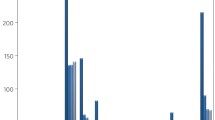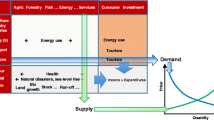Abstract
An effective climate agreement is urgently required, yet conflict between parties prevails over cooperation. Thanks to advances in science it is now possible to quantify the global carbon budget, the amount of available cumulative CO2 emissions before crossing the 2 ∘C threshold (Meinshausen et al. Nature 458(7242):1158–1162, 2009). Countries carbon claims, however, exceed this. Historically such situations have been tackled with bankruptcy division rules. We argue that framing climate negotiations as a classical conflicting claims problem (O’Neill Math Soc Sci 2(4):345–371, 1982) may provide for an effective climate policy. We analyze the allocation of the global carbon budget among parties claiming the maximum emissions rights possible. Based on the selection of some desirable principles, we propose an efficient and sustainable allocation of the available carbon budget for the period 2000 to 2050 taking into account different risk scenarios.
Similar content being viewed by others
Notes
Intended Nationally Determined Contributions (INDC) in the Paris agreement in 2015 follows this logic. Each country’s pledge is based on heterogeneous criteria.
Given the purpose of this article, the authors would have considered further decomposition of the groups used as agents, however, the only regional decomposition for future cumulative emissions is only available at IPCC (2000). Although other possibilities such as the more recent RCP-database have been considered, to the best of our knowledge no database other than SRES-IPCC decomposes cumulative emissions by groups of countries.
References
Aumann R J, Maschler M (1985) Game theoretic analysis of a bankruptcy from the Talmud. J Econ Theory 36:195–213
Beccherle J, Tirole J (2011) Regional initiatives and the cost of delaying climate change agreements. J Public Econ 95(11–12):1339–1348
Bretschger L (2013) Climate policy and equity principles: fair burden sharing in a dynamic world. Environ Dev Econ 18(5):517–536
Caney S (2009) Justice and the distribution of greenhouse gas emissions. J Glob Ethics 5(2):125–146
Curiel J, Maschler M, Tijs S (1987) Bankruptcy games. Z Oper Res 31:A143–A159
Dagan N, Volij O (1993) The bankruptcy problem: a cooperative bargaining approach. Math Soc Sci 26:287–287
Duro J A, Teixidó-Figueras J (2014) World polarization in carbon emissions, potential conflict and groups: an upyeard revision. Energy Policy 74(0):425–432
Finus M, Pintassilgo P (2013) The role of uncertainty and learning for the success of international climate agreements. J Public Econ 103(0):29–43
Frame D, Hepburn C (2012) Emerging markets and climate change: Mexican standoff or lowcarbon race? In: Hahn R W, Ulph A (eds) Climate change and common sense. Oxford University Press, Oxford
Frame D J, Macey A H, Allen M R (2014) Cumulative emissions and climate policy. Nat Geosci 7:692–693
Giménez-Gómez J -M, Peris J E (2014) A proportional approach to claims problems with a guaranteed minimum. Eur J Oper Res 232(1):109–116
Grasso M (2012) Sharing the emission budget. Polit Stud 60:668–686
Grasso M, Roberts J (2014) A compromise to break the climate impasse. Nat Clim Chang 4:543–549
Herrero C, Villar A (2001) The three musketeers: four classical solutions to bankruptcy problems. Math Soc Sci 42(3):307–328
Iñarra E, Prellezo R (2008) Bankruptcy of fishing resources: the northern European anglerfish fishery. Mar Resour Econ 17:291–307
IPCC (2000) Special report on emissions scenarios, nakicenovic, n. and swart edition. Cambridge University Press, Cambridge
IPCC (2013) Climate change 2013: the physical science basis. In: Stocker TF, Qin D, Plattner G-K, Tignor M, Allen SK, Boschung J, Nauels A, Xia Y, Bex V, Midgley PM (eds) Contribution of working group I to the fifth assessment report of the intergovernmental panel on climate change. Cambridge University Press, Cambridge
IPCC (2014) Climate change: mitigation of climate change. In: Edenhofer O, Pichs-Madruga R, Sokona Y, Farahani E, Kadner S, Seyboth K, Adler A, Baum I, Brunner S, Eickemeier P, Kriemann B, Savolainen J, Schlömer S, von Stechow C, Zwickel T, Minx JC (eds) Contribution of working group III to the fifth assessment report of the intergovernmental panel on climate change. Cambridge University Press, Cambridge
Llavador H, Roemer J, Silvestre J (2015) North-south convergence and the allocation of CO2 emissions. Clim. Chang. 130(3):383–395
Maimonides M (2000) Book of Judgements, (translated by Rabbi Elihahu Touger, 2000). Moznaim Publishing Corporation, NewYork, Jerusalem
Meinshausen M, Meinshausen N, Hare W, Raper S B, Frieler K, Knutti R, Frame D, Allen M (2009) Greenhouse-gas emission targets for limiting global warming to 2 ∘C. Nature 458(7242):1158–1162
Moulin H (2002) Axiomatic cost and surplus sharing . In: Arrow AK, Sen K (eds) Handbook of social choice and welfare, vol 1. Elsevier. North Holland, Amsterdam, pp 289–357
O’Neill B (1982) A problem of rights arbitration from the Talmud. Math Soc Sci 2(4):345–371
Raupach M R, Davis S J, Peters G P, Andrew R M, Canadell J G, Ciais P, Friedlingstein P, Jotzo F, van Vuuren D P (2014) Sharing a quota on cumulative carbon emissions. Nat Clim Chang 4:873–879
Rockstrom J, Steffen W, Noone K, Persson A, Chapin FS III, Lambin E F, Lenton T M, Scheffer M, Folke C, Schellnhuber H J, Nykvist B, de Wit C A, Hughes T, van der Leeuw S, Rodhe H, Sorlin S, Snyder P K, Costanza R, Svedin U, Falkenmark M, Karlberg L, Corell R W, Fabry V J, Hansen J, Walker B, Liverman D, Richardson K, Crutzen P, Foley AJ (2009) A safe operating space for humanity. Nature 461(7263):472–475
Schmeidler D (1969) The nucleolus of a characteristic function game. SIAM J Appl Math 17:1163–1170
Thomson W (2006) How to divide when there is enough: from the Talmud to game theory. Manuscript. University of Rochester
Thomson W (2015) Axiomatic and game-theoretic analysis of bankruptcy and taxation problems: an update. Math Soc Sci
Vasconcelos V V, Santos F C, Pacheco J M (2013) A bottom-up institutional approach to cooperative governance of risky commons. Nat Clim Chang 3:797–801
WGBU (2009) Solving the climate dilemma: the budget approach. Special Report, German Advisory Council on Global Change
Acknowledgments
The authors are deeply grateful to H. Llavador, Laurie Anderson and two anonymous reviewers and the co-editors of this journal, for their comments which considerably helped us to improve this manuscript. For their suggestions we also thank seminar participants at Univ. Rovira i Virgili, Univ. de Barcelona, Univ. Politécnica de Cartagena, and European University Institute. The usual caveats apply. Financial support from Generalitat de Catalunya (2014SGR325 and 2014SGR631) and Ministerio de Economía y Competitividad (ECO2014-52340-P and ECO2013-45380-P) is acknowledged.
Author information
Authors and Affiliations
Corresponding author
Electronic supplementary material
Below is the link to the electronic supplementary material.
Rights and permissions
About this article
Cite this article
Giménez-Gómez, JM., Teixidó-Figueras, J. & Vilella, C. The global carbon budget: a conflicting claims problem. Climatic Change 136, 693–703 (2016). https://doi.org/10.1007/s10584-016-1633-1
Received:
Accepted:
Published:
Issue Date:
DOI: https://doi.org/10.1007/s10584-016-1633-1




